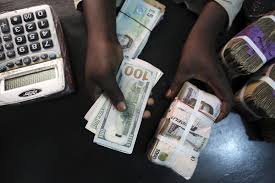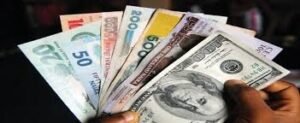Does the Nigerian Economy stand any chance of stabilizing with the reform adopted by the
The Central Bank of Nigeria (CBN)?
A holistic approach towards giving the naira a fresh lease of life that will lift it from slumbering is long-awaited The apex bank, recently made headlines with its decision to sell dollars to Bureau De Change (BDC) operators below the market rate. Consequently triggering mixed reactions from informed financial.
In this report, Gom Mirian explores the implications of the policy for the ordinary Nigerian as well as the economy.
Financial Experts’ Perspectives
Financial experts are divided over the CBN’s decision to sell dollars to BDC operators below the market rate. Some experts question the transparency of this move, while others believe it could enhance liquidity in the foreign exchange (FX) market.
In an interview with Africa Health Report (AHR), experts expressed mixed feelings about the sustainability of the CBN’s initiative. Some analysts criticised the CBN’s handling of the Naira floating policy, pointing out a lack of transparency and efficiency in establishing a single FX market. They emphasised the importance of market mechanisms for efficient resource allocation.

On the other hand, some experts support the CBN’s sale of foreign exchange to BDC operators. While acknowledging the short-term benefits, they advise the CBN to focus on bolstering foreign exchange earnings to safeguard reserves. They believe that the initiative’s sustainability depends on enhanced oversight and increased FX reserves.
What Experts Are Saying
Nnamdi Ajaegbu, financial analyst at FSL Securities Limited in an exclusive chat with AHR, expressed support for the CBN’s decision to continue selling foreign exchange (FX) to Bureau de Change (BDC) operators.
He believes this move is aimed at enhancing dollar liquidity within the system and strengthening the Naira against the dollar, suggesting that this strategy is intended to signal to the market that the Naira is undervalued and that the CBN is committed to meeting the demand for dollars for approved invisible transactions.
“While there may be some transparency concerns, selling dollars to Bureau de Change operators can enhance liquidity in the FX market. This can help reduce the exchange rate premium and address distortions in the retail end of the market. However, the sustainability of this initiative depends on increased oversight and efforts to boost foreign exchange earnings to safeguard reserves.
“However, the CBN will have to improve on its foreign exchange earnings to prevent weakening its foreign reserves,” he said.
Dr Musbau Aroueh, financial expert at Highcap Securities Limited, in an exclusive interview with AHR, raised concerns over the CBN’s handling of the Naira floating policy, stating that it has failed to establish a transparent and efficient single foreign exchange market.
Aroueh emphasized the necessity of creating a market structure that allows all economic entities to participate in buying and selling foreign exchange through authorized market operators.
He argued that such a structure would effectively allocate hard currencies to various competing needs and produce a single market clearance rate that accurately reflects the true value of the Naira.
Highlighting the current shortcomings, he pointed out that the CBN’s approach involves selective sales of hard currency to banks and Bureau de Change (BDC) operators, which lacks transparency and is susceptible to illicit transactions.
“The selective sale of hard currency to banks and BDCs by CBN is non-transparent and prone to shady deals. It is a flawed strategy that cannot sustainably stabilize the Naira,” he said “It is inimical to the policy objective of letting market mechanisms allocate scarce economic resources in the economy to achieve efficiency.
“The CBN’s decision to sell dollars to Bureau de Change operators below the market rate raises concerns about transparency. It creates an unfair advantage for these operators and could lead to distortions in the FX market. The central bank should focus on establishing a transparent and efficient single foreign exchange market to ensure fair resource allocation.”
Experts defend CBN
Wale Sunday, an investment banker and stockbroker, said that the CBN employs a multilevel strategy to safeguard Naira’s stability.
According to Sunday, the CBN’s approach includes inducements such as interest rate adjustments to attract foreign portfolio investors, offering government securities at sizable amounts to maintain high interest rates, and providing direct dollar allocations to BDC operators to curb or minimize irregular behaviour within the market.
He emphasized the complexity of the CBN’s strategy and expressed confidence that the central bank has implemented appropriate mechanisms to ensure its sustainability. He warned that failure to maintain these mechanisms could lead to disastrous consequences.
He noted that the sustainability of the CBN’s strategy hinges on its ability to exert pressure on the government to enhance both crude oil production and non-oil exports.
He believes that once these factors are optimized, speculative attacks on the Naira will significantly diminish.
On his part, Olatunde, an Accountant and Investment expert, commended the Central Bank of Nigeria’s (CBN) decision to provide liquidity to the retail end of the foreign exchange (FX) market.
According to him, this move is beneficial as it addresses the need for liquidity while reducing market distortions.
Olatunde said the initiative is sustainable because the CBN has implemented measures to sanitize the retail FX platform and closely monitors the activities of market participants.
He highlighted that this approach gives the CBN visibility into actual demand, which helps to dispel misconceptions about the volume of FX being disbursed.
Bureau De Change Operators’ Opinions
Bureau De Change (BDC) operators play a crucial role in the FX market, facilitating currency exchange for individuals and businesses. AHR also reached out to some BDC operators to gather their opinions on the CBN’s recent policy.
The President of the Association of Bureau de Change Operators of Nigeria, Aminu Gwadabe, expressed optimism about the CBN’s decision to sell dollars to BDCs below the market rate.

In an interview with AHR Gwadabe noted that BDCs play a critical role in facilitating retail transactions and highlighted the effectiveness of their operations in response to the latest intervention by the Central Bank.
Gwadabe believes that this move will help stabilize the exchange rate and improve liquidity in the market. “The CBN’s intervention will provide us with the necessary liquidity to meet the demands of our customers and support economic activities.”
He also discussed the ongoing concerns regarding FX misalignment and the fair value of the Naira. He underscored the need for fiscal discipline and highlighted the impact of corruption on economic stability.
Also, the interview delved into the challenges faced by BDCs in meeting the Central Bank’s new minimum capital requirements. Gwadabe acknowledged the high capitalization requirements and ongoing negotiations with the Central Bank to ensure the inclusion of all BDC members in the regulatory framework. Despite the hurdles, he called for continued collaboration and expressed confidence in a mutually beneficial outcome.

In contrast, Abba Tanko, a BDC operator at Wuse Zone 4, Abuja raised concerns about the sustainability of the CBN’s initiative.
He highlighted the challenges faced by BDC operators in maintaining profitability amid fluctuating exchange rates. “The CBN’s sale of foreign exchange to us at a lower rate is a welcome development. It allows us to serve our customers better and meet their FX needs,” he said. “This initiative will also help reduce the exchange rate premium and stabilize the market. However, the release of this hard currency by the CBN is very poor, imagine in Abuja alone of over 4500 BDC operators the apex bank will release only 40 to 50 dollars a day. How many people will get it.?” Tanko asked while speaking with AHR.”
He continued, “We hope the CBN will continue to monitor the market and ensure that the benefits are sustained and the currency is accessible by operators.”
Another bureau de change operator, Joy Ani, notes, “While the new rate is beneficial to Nigerians, it might lead to a surge in demand for foreign exchange, putting pressure on the already scarce forex resources.”
CBN’s Recent Dollar Sales to BDCs
The CBN recently stated to the public, informing BDC operators of the sale of $20,000 to each operator at a rate of N1,450 to $1.
The naira has come under pressure in recent weeks, hitting 1,640 on July 18, its lowest in four months.
This comes as a second move after a prolonged suspension of FX sales to BDCs in 2021, which was lifted earlier in the year following the revocation of licenses of over 4,173 BDC operators in February.
According to the statement, BDC operators are instructed to sell the dollars to eligible customers at a rate not exceeding 1.5% above the purchase price. This initiative aims to address distortions in the retail end of the market and reduce the exchange rate premium in the parallel market.
The Impact on Ordinary Nigerians
For ordinary Nigerians, the CBN’s decision to sell dollars to Bureau de Change operators below the market rate is expected to have a direct effect on the lives of Nigerians, particularly those who rely on BDCs for their foreign exchange needs. With the new rate of 1,450 naira to a dollar, these eligible BDC operators can now provide more foreign exchange at a reasonable cost. This development is set to create more accessibility and affordability for individuals, importers, and small businesses who rely on foreign exchange transactions.
In an interview, Dr. Muhammed Isah, an economist, highlights the immediate benefits of the new policy and said it could have both positive and negative implications, stating, “It will help ease the burden on Nigerians by making foreign exchange more accessible, and it will also help stimulate economic activities.”
“On the positive side, it can lead to increased availability of foreign exchange, making it easier for individuals and businesses to access dollars for various purposes, such as travel or imports.


“This initiative can also contribute to the reduction of the exchange rate premium, which has been a significant concern for many Nigerians. A lower exchange rate premium means that individuals will get more value for their Naira when exchanging it for dollars or other foreign currencies.
“However, there are also potential drawbacks to this policy.
Ishah argues that the selective sales of hard currency to Bureau de Change operators could create distortions in the market, favouring certain individuals or groups. This could undermine the transparency and fairness of the overall forex market.”
He said the sustainability of this initiative is a concern. While it may provide short-term benefits, there is a need for a long-term plan to address the root causes of foreign exchange challenges in Nigeria. This includes efforts to boost foreign exchange earnings, enhance oversight, and establish a transparent and efficient single foreign exchange market.
Economic Implications
The CBN’s FX policy reform is expected to have a significant impact on the Nigerian economy. This move could potentially boost economic activities, encourage investment, and attract foreign direct investment. The availability of more foreign exchange at a reasonable rate will make it easier for businesses to import goods and services, which could lead to increased productivity and job creation.
“The CBN’s decision to sell foreign exchange to eligible BDC operators at a relatively lower rate is a step in the right direction. It will help stabilize the forex market, attract foreign investors, and create an enabling environment for economic growth,” Isah said.
Inflation Concerns
While the move by the CBN promises to provide relief to Nigerians and stimulate the economy, there are concerns about the impact on the country’s soaring inflation rate.
The policy could lead to increased money supply, further fueling inflationary pressures.
However, Isah has expressed optimism that the expected positive impact on economic activities will outweigh any potential negative effects on inflation.
Ishah explains, “While it is essential to be cautious about the inflationary impact, the benefits of stimulating the economy and improving economic activities, which will lead to more jobs, increased production, and ultimately lower prices, cannot be ignored.”
The CBN’s decision to sell dollars to Bureau de Change operators below the market rate has generated mixed reactions among financial experts.
While some criticize its lack of transparency, others see it as a means to enhance liquidity and stabilize the FX market.
The opinions of Bureau de Change operators also vary, with some welcoming the initiative and others emphasizing the need for long-term solutions.
For ordinary Nigerians, this policy could have both positive and negative effects. It can increase the availability of foreign exchange and reduce the exchange rate premium, benefiting individuals and businesses.
However, concerns about transparency and the sustainability of the initiative remain.
The CBN must address these concerns and work towards establishing a stable and transparent forex market for the overall benefit of the Nigerian economy.



